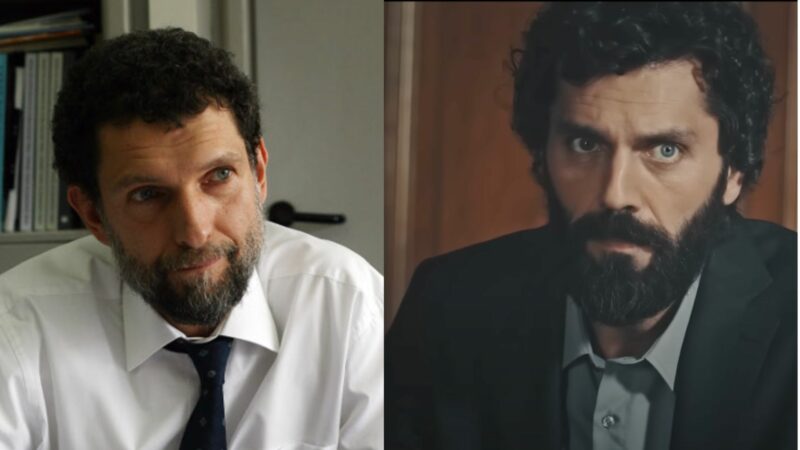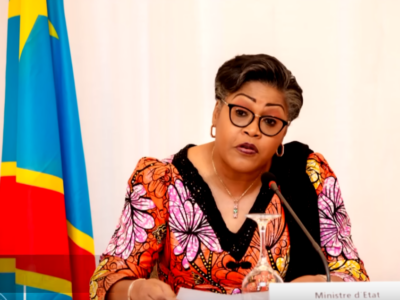
Image by Arzu Geybullayeva. On the left is jailed philanthropist Osman Kavala, on the right is actor Can Nergis who stars as Teoman Bayramli in the new TV series “Metamorphosis.“
Turkey's civil society has been abuzz about a controversial new TV series that the national public broadcaster, TRT, premiered on its streaming platform on May 7, 2023. According to the creators, the series, called “Metamorphosis,” tells the story of Teoman Bayramli, a one-time-activist who turns into a ruthless businessman after Bayramli takes over his family's business and becomes entangled in illegal dealings, conspiracies, and more. The series is stirring controversy because Bayramli is seemingly meant to allude to the well-known philanthropist Osman Kavala, who has been unjustly jailed since 2017 and is currently serving a life sentence.
Similarities to Osman Kavala
Actor Can Nergis, who stars as Bayramli, looks suspiciously similar to Kavala. The plot of the series mirrors Kavala's life, but is threaded with false narratives — the same narratives used by the government to indict and jail him. “It is a demonized version of the flesh-and-blood philanthropist and businessman, who is serving a life sentence due to trumped-up espionage charges and attempts to overthrow the government,” wrote journalist Nazlan Ertan.
The broadcaster failed to mention anywhere in the series that the show is based on fictional characters. It's been subject to much scrutiny by critics, who have called the show a “grotesque defamation of Kavala,” as well as supporters and advocates calling for Kavala's release ever since the philanthropist was put behind bars. Kavala's wife, Ayse Bugra, said the series was “part of the defamation campaign” targeting her husband.
In a statement sent from jail, Osman Kavala expressed his surprise and sadness at the series:
#OsmanKavala‘s statement about the series broadcast on TRT's digital platform 👇https://t.co/uhIjglCQr0 pic.twitter.com/y55vhnuQpn
— Kavala'ya Özgürlük (@FreeOsmanKavala) June 20, 2023
Nergis spoke fondly of the series during an interview on YouTube channel TV100. “It is an international spy story about a revolutionary man who turns into a capitalist. There is love, and lots of action. I really thought the show speaks to an international audience and this is why I decided to become a part of it.”
These words did not go down well. On Twitter, Nergis was criticized for becoming part of a “character assassination” campaign against Kavala. Veteran journalist Rusen Cakir wrote on Twitter the actor “did not seem bothered” about the show's explicit targeting of Kavala. Lecturer, Karabekir Akkoyunlu, wrote:
Bu dizide emeği geçen herkes, siyasi bir kin güdüsüyle ipe sapa gelmez suçlamalar üzerinden hapiste çürütülen masum bir insanın alçakça şeytanlaştırılmasında pay sahibidir. Kimse ekmek parası filan demesin.
Simit sat onurlu yaşa Can Nergis! https://t.co/VF4pYOCelo
— Karabekir Akkoyunlu (@ulu_manitu) June 20, 2023
Everyone involved in this series has a share in the despicable demonization of an innocent person left to rot in prison on trivial accusations driven by a political grudge. Nobody should say it's bread money. Sell bagels, live proudly, Nergis!
Others expressed their disappointment with having the actor on TV100 in the first place.
TRT's streaming platform is yet to release all episodes in the series. In his interview on TV100, actor Nergis said the crew finished the filming of ten episodes and will start filming the second season in the fall. According to Nergis, the show was planned to last three seasons.
The AKP's war on arts and culture
During the annual Presidential Culture and Arts Grand Awards ceremony in December 2021, President Recep Tayyip Erdoğan addressed the crowd, saying, “The stronger you are in culture and arts, the more you can direct and manage your environment. It is a fact that the most powerful weapons of those who manage the global system today are the tools of culture.” In the years since his ascent to power, Erdoğan's ruling Justice and Development Party (AKP) has slowly taken control over much of the country's art and culture scene.
Scores of well-known artists, singers, songwriters, and comedians have faced intimidation, crackdowns, censorship, and threats over their work. These groups are known for using their trades to talk about nationwide grievances and politics and are therefore perceived as a threat to the ruling party. Even theater, humor, and satire groups have faced significant pressure from the ruling leadership. There are also been plenty of examples of the ruling government attempting to block television series, shows, and foreign music. The justifications are often broad, with accusations that the material promotes terrorist propaganda, encourages drug use, insults the president, offends local family values, or even offers cultural disinformation.
But it was not always like this.
In his reflections on the early years of AKP's rule, academic Emre Tansu Keten wrote that when the AKP came to power in 2002, they had a significant focus on arts and culture, and several important art institutions opened between 2002 and 2011. “The harmonization process with the European Union and the encouragement of the private sector to invest in the field of culture and arts brought about the harmonization of the cultural field with the neoliberal economic program and the AKP's support of this process by abandoning its own cultural agenda — for a while,” wrote Keten.
But changes within the fabric of the political leadership — especially in the aftermath of the Gezi Park protests — shifted the ruling party's view of artistic and cultural trends in the country, “the government, which saw the cultural field as an economic and diplomatic tool throughout the 2000s, would start to politically instrumentalize culture after 2010, especially after the Gezi Uprising, due to the identity-based cultural polarization policy it stuck to,” wrote Keten.
It is not surprising that the first episode of “Metamorphosis” also contains scenes that look starkly similar to the scenes from Gezi Protests. It was May 28, 2013, when a group of environmentalists decided to challenge the decision to demolish one of Istanbul's few remaining green spaces, Gezi Park. They gathered and set up tents in the park. They were soon met with tear gas in a widely-criticized show of police force.
In the coming weeks and months, students, academics, civil society advocates, and everyday citizens joined the non-violent protests. The Gezi movement became perhaps the largest act of civil disobedience in Turkish history, an unprecedented affront to the conservative Justice and Development Party (AKP) government.
These protests were also used in the indictment against Osman Kavala, who was charged with “attempting to overthrow the constitutional order” and “attempting to overthrow the government” over his alleged financing of the Gezi Protests in 2013.
“Kavala's arrest was a package. That package included regressing the civil society, revenge over Gezi, and the narrowing of cultural spaces. Now, they are trying to fill that narrowed cultural space with propaganda series,” wrote journalist Candan Yildiz in her column.






